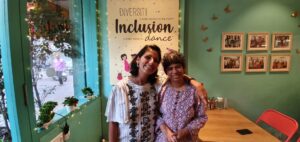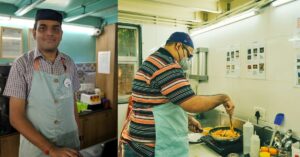It has been seven odd years since Mumbai-based Aarti Nagarkar (35) moved back to India from the States, but ask her about her favourite things in life, and she says without hesitation, “Chipotle Mexican Grill, and relaxing while watching The Tonight Show with Jimmy Fallon!”
While Aarti’s workplace is barely a five-minute walk from her residence in Juhu, she takes a secluded route on the insides of the upmarket neighbourhood to avoid its regular commotion. As a person with autism, she abides by three golden rules — no to fireworks, barking dogs, and loud crowds.
She is among the 18 full-time employees at Café Arpan, a one-of-its-kind establishment where all servers, kitchen and counter assistants have some kind of intellectual and developmental disabilities (IDDs). The Café was set up in 2018 by the Yash Charitable Trust (YCT), a city-based NGO that has been providing skill development and livelihood opportunities to adults with IDDs since 2014.
It was heavily inspired by one Puzzle Café in Manila, Philippines, opened by a couple to offer a safe working environment for their autistic son, says Ashaita Mahajan, Aarti’s cousin and co-founder of Café Arpan.
“Aarti and I were born six days apart and share an extremely special bond. Soon after she moved back to Mumbai, her mother Sushama founded the YCT on the pillars of acceptance, empowerment and inclusion. I quit my job in the culture sector to come on board as an active trustee in 2017. A year later, my aunt and I opened the Café to offer a live demonstration of what is possible if PwIDDs are provided with the opportunity to lead a dignified life,” Ashaita tells The Better India.
It is estimated that 3 per cent of India’s population, or 31 million individuals, live with IDDs, as per a ResearchGate report. Covering a wide spectrum of conditions such as autism, asperger’s syndrome, down syndrome, and cerebral palsy, IDDs often present at birth and distinctively impact an individual’s physical, intellectual, emotional and/or social skills.
“There are so many organisations that exclusively work towards providing interventional support to children with disabilities. But the reality is they all grow up to be adults who can’t be expected to continue functioning within [the safety of] special schools. Yes, there are some people on the autism spectrum who are high-functioning and capable of going to college, eventually leading fairly ‘normal’ lives. But others like Aarti wouldn’t be able to get a job in the open market easily,” she notes. “At the same time, they have so many strengths and all they need is a boost of confidence, and a platform that allows them to showcase their skills.”

From a ‘Dabba’ Service to a City Hub
Located across the SNDT Women’s University’s Juhu campus in Santacruz West, Café Arpan plays host to dozens of customers every day who wander in for its inhouse focaccia bread sandwiches, methi puri chaat, nachni wraps, hummus and falafel, among other small bites and hot & cold beverages.
“We also offer plenty of gluten-free, vegan and Jain options. The Café has a lovely aroma of coffee at all times, thanks to our star beverage-maker Anand who measures all ingredients to the ‘t’. We’ve been told several times that his cold coffee is the best our customers have had in the city,” says Ashaita.
“Our head chef Aaron, who is autistic, has the memory of an elephant. He remembers all our recipes by heart, but we mostly approach him to remind us of everyone’s birthdays,” she adds with a laugh.
Customers at Café Arpan are usually greeted and seated by Aarti, who works as a server. Occasionally, however, she also sings to customers she hits it off with. “I take classes in opera, western and Hindustani classical music, and also play the piano. Someday, I’m going to be a superstar singer,” she grins.
Meanwhile, a bulk of the orders and the Café’s regular earnings are handled by Nikhil Sharma (40), one of the two counter assistants at Café Arpan, who has asperger’s syndrome. “Sometimes, I get angry and anxious when I think of the past, but I calm down when I remember [the coping mechanisms taught to me by] my father. It makes me happy to be a working man. I pay close attention to how the manager works and eventually, I could also become one,” he says.
Even as Café Arpan now enjoys an excellent reputation in the neighbourhood, its humble beginnings are to be traced to a dabba (tiffin) service launched by YCT in 2015 with a team of only four members, including Aarti.
“We had decided to convert a family-owned garage in Vikhroli to a small kitchen and collaborated with a home chef, starting with catering to her existing customers. Before we knew it, we had gone viral on WhatsApp. By 2017, we had about 15 members and the kitchen was starting to become crowded. That’s when we first started conceptualising Café Arpan,” says Ashaita, adding that the tiffin service was later rebranded to Arpan Food Services.
“Another key element that was missing was that team members couldn’t interact with our customers for too long. We knew that they looked forward to making the deliveries because they used to fight about it. Now at Café Arpan, they’ve emerged as social butterflies — so many of our customers specifically enquire about particular members’ shifts, just so they can come in to meet them,” she adds.
Even as the YCT primarily relied on the family’s personal network for monetary support, the trustees launched a fundraising campaign on ImpactGuru to raise additional money for setting up Café Arpan. Within the first two weeks, they had raised Rs 5 lakh.
“The response was overwhelmingly positive. By the end of five months, we had managed to raise Rs 12 lakh, and we were extremely cautious on how to spend the money. We faced some discrimination in terms of procuring the location, as some landlords were willing to rent a space to an NGO working with differently-abled adults. As luck would have it, we found the perfect space next to our garage, which could operate as a back-end kitchen until the Café’s construction was completed,” she says.
While Ashaita’s sister-in-law undertook the designing of the Café’s interiors, a friend took care of its branding, Meanwhile, a fellow YCT trustee’s son-in-law designed the initial menu. On 2 August 2018, the establishment was inaugurated by noted filmmaker Kiran Rao — all thanks to Aarti.
“Back in April (2018), Aarti was invited to be a panellist at an independent documentary festival in Colaba, and she happened to sit next to Kiran Rao, who was a moderator at the event. Charmed by her words, Kiran later invited us to her dressing room and Aarti spontaneously invited her to the inauguration. We kept in touch and months later, she showed up,” recalls Ashaita.
With the YCT being fortunate enough to receive ample media attention and support from individuals, Ashaita says that several families gradually started approaching them to seek employment opportunities for their adult sons and daughters with IDDs.
“So in 2019, we decided to launch a skill development centre. Presently, we have about four trainers leading enrichment therapies by way of music, dance, art and craft, yoga and other physical fitness activities. Of the 32 PwIDDs associated with us, 18 are salaried employees who work rotating shifts to split their time between the Arpan Food Services and the Café. We’re also training two women to become trainers so that it might help in possible expansions in the future,” she adds.
The only requisites they look for, she says, is that candidates must have a disability certificate and be able to independently use the washroom. At the skill centre, they are given lessons on both interpersonal communication and industry practices.
“We recently had two team members from the skill centre graduate to working for the Arpan Food Services. Given the right guidance and support, PwIDDs can function perfectly fine. We don’t want their families and society to see them as a burden, or have them waste away a shot at a meaningful life,” she says.

The Way Ahead
Owing to growing disability inclusion at Indian workplaces in recent times, Café Arpan has also been approached by other food-based organisations to hire PwIDDs.
“We’ve been very lucky to place a team member at a restaurant, who has been included in their workplace beautifully; his team members absolutely adore him. On the other hand, another young man was not only denied adequate opportunities but was exposed to pornographic material. But you wouldn’t be able to tell this if you met him now; he has so much potential and does wonderful work for the community. It’s heartbreaking to come across these negative instances, but all the more important to highlight the positive ones,” she notes.
Last year, Ashaita says that Café Arpan got a glimpse of what they hope is in store for them in the future. The establishment was approached by the Vikhroli office of Accenture in January 2020, to run an in-house Café for over 3,000 of their employees.
“It was one of the best experiences we’ve had in the history of YCT. Not only was a corporation bringing us on board on an equal footing, they were also providing us free space, bearing transportation costs and a steady stream of customers. We had the opportunity to work for them for about three months until the COVID-19 outbreak hit India. They haven’t resumed physical hours at full capacity yet, but we’ve been told we’ll get a chance to resume our services once they do,” she says.
“People keep asking me when we’re opening more outlets of Café Arpan. I tell them I’d be happy to open a pop-up in every corner of the country, so long as they sponsor me,” she laughs.
For more information, you can contact Café Arpan. You can also donate to Yash Charitable Trust here.
Edited by Yoshita Rao
No comments:
Post a Comment